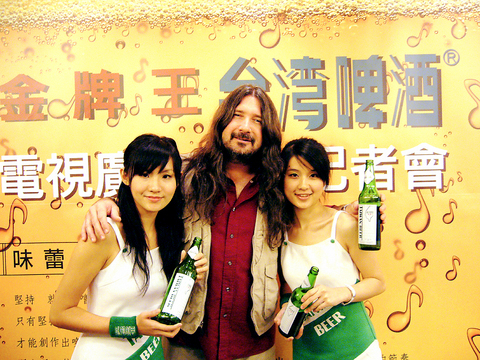Taiwan Beer got a new look earlier this week, when popular environmentalist and musician Matthew Lien stepped up to become the official advertising face for Taiwan Tobacco & Liquor Corp's (TTL,
While endorsing beer is a new direction for the eco-musician who is better known for his sanctioning of, and support for, cultural events and environmental awareness programs for children, it isn't the first time he's been used by a local company to advertise its products.
Five years ago Lien's environmentally friendly image was used to advertise a brand of canned coffee. The coffee advertising campaign might have proven mildly successful, but Lien never envisioned that one day he'd be the poster boy for Taiwan Beer.

PHOTO: GAVIN PHIPPS, TAIPEI TIMES
"I was pleasantly surprised and had no idea that I was on [TTL's] radar. It certainly suits me, though. I mean, I've drunk so much Taiwan Beer over the years that I probably should be a shareholder and I have no problem in endorsing the product as it's a [good] product," Lien said.
"In the long run I think it will lighten the public perception of me which is one of contemplation and of being quite serious."
While it is the first time the company has used a foreign face to advertise and endorse its products, Lien is the second musician to have been enlisted in order to popularize a brand of beer.
Earlier this year the TTL enlisted the help of Taiwan's best-known rock and roller, Wu Bai (
Following the success of the Gold Medal brand, TTL decided to introduce more brands in order to fend off some stiff competition from its closest rival Heineken, which is the second best selling beer in Taiwan and accounts for 8 percent of the market.
The new TV commercial, which is set to begin airing later next month, is radically different from Wu Bai's noisy rock and roll beer image. The 30 second advertisement features Lien as he peacefully records the sounds of nature. While recording he befriends a group of river tracers and after jumping from the top of the waterfall and enjoying a brisk swim Lien and his new friends enjoy a glass of Superbrew Taiwan Beer together.
TTL will have to wait and see how the image of a foreigner seen drinking and endorsing Taiwan Beer on national TV will sit with the masses more accustomed to the loud Wu Bai commercial, but the company feels it has made the right choice.
"It's a new brand and we wanted to take a different approach. We wanted to show how fresh the beer is and how natural the ingredients are," said TTL Chairman Ray Dawn (
According to figures made available from TTL, on average 475 million liters of beer are consumed in Taiwan every year, which when you work it out on an individual level equates to roughly 21l for each of the nation's 23 million inhabitants.
Whether Lien's face will increase these percentages isn't yet known, but regardless of the eventual outcome the eco-musician has a few choice words of wisdom for drinkers of "other" brands who might be contemplating switching to Superbrew.
"If everyone does their patriotic duty and adheres to the product then you never know," quipped Lien. "[We] could drink [our] way to independence."

That US assistance was a model for Taiwan’s spectacular development success was early recognized by policymakers and analysts. In a report to the US Congress for the fiscal year 1962, former President John F. Kennedy noted Taiwan’s “rapid economic growth,” was “producing a substantial net gain in living.” Kennedy had a stake in Taiwan’s achievements and the US’ official development assistance (ODA) in general: In September 1961, his entreaty to make the 1960s a “decade of development,” and an accompanying proposal for dedicated legislation to this end, had been formalized by congressional passage of the Foreign Assistance Act. Two

March 31 to April 6 On May 13, 1950, National Taiwan University Hospital otolaryngologist Su You-peng (蘇友鵬) was summoned to the director’s office. He thought someone had complained about him practicing the violin at night, but when he entered the room, he knew something was terribly wrong. He saw several burly men who appeared to be government secret agents, and three other resident doctors: internist Hsu Chiang (許強), dermatologist Hu Pao-chen (胡寶珍) and ophthalmologist Hu Hsin-lin (胡鑫麟). They were handcuffed, herded onto two jeeps and taken to the Secrecy Bureau (保密局) for questioning. Su was still in his doctor’s robes at

Last week the Democratic Progressive Party (DPP) said that the budget cuts voted for by the China-aligned parties in the legislature, are intended to force the DPP to hike electricity rates. The public would then blame it for the rate hike. It’s fairly clear that the first part of that is correct. Slashing the budget of state-run Taiwan Power Co (Taipower, 台電) is a move intended to cause discontent with the DPP when electricity rates go up. Taipower’s debt, NT$422.9 billion (US$12.78 billion), is one of the numerous permanent crises created by the nation’s construction-industrial state and the developmentalist mentality it

Experts say that the devastating earthquake in Myanmar on Friday was likely the strongest to hit the country in decades, with disaster modeling suggesting thousands could be dead. Automatic assessments from the US Geological Survey (USGS) said the shallow 7.7-magnitude quake northwest of the central Myanmar city of Sagaing triggered a red alert for shaking-related fatalities and economic losses. “High casualties and extensive damage are probable and the disaster is likely widespread,” it said, locating the epicentre near the central Myanmar city of Mandalay, home to more than a million people. Myanmar’s ruling junta said on Saturday morning that the number killed had